Germany vs Google: How Street View Won the Privacy Battle in Europe’s Most Private Country
![]()
For residents and tourists alike, Google Maps Street View is an exceptionally useful navigational tool. However, not every country has welcomed Google’s iconic Street View cars to their streets. One of these longtime holdouts, Germany, has only recently begun to change its tune after more than a decade of resistance. But why?
Germans Place High Value on Privacy
The European Union has some of the world’s strictest regulations and requirements concerning data protection, as evidenced by the General Data Protection Regulation (GDPR) and record-breaking fines levied against tech companies that mishandle data. Even in the context of a privacy-obsessed EU, Germany on the whole is especially passionate about privacy.
A 2015 Harvard Business Review study put the value of privacy to the test. In a survey of nearly a thousand people across five countries (the United States, United Kingdom, Germany, China, and India), researchers tested how much respondents would be willing to pay to keep different types of data private.
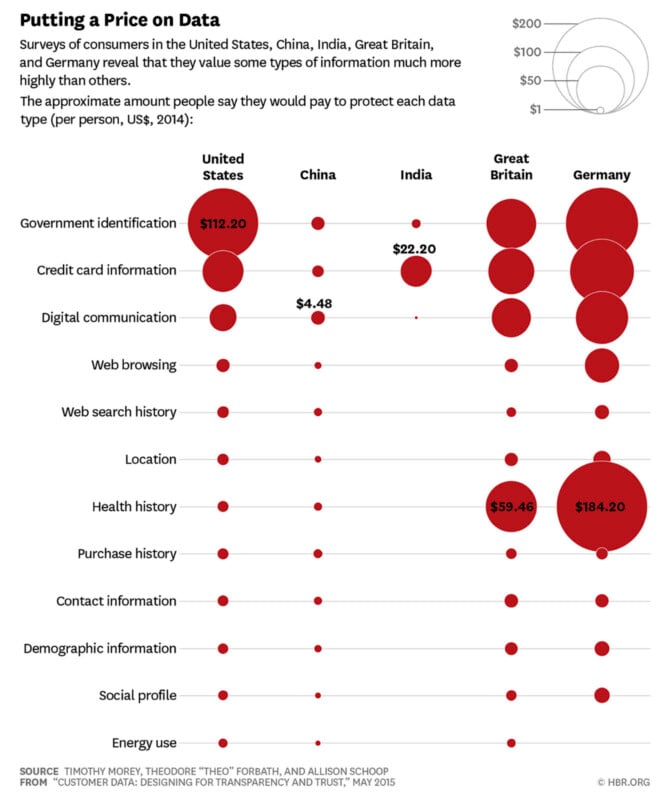
Across the board, surveyed Germans were willing to pay relatively high prices to protect data including government identification, credit card information, digital communication history, web browsing, and health history. In fact, German respondents were willing to pay $184 to protect their health history, the highest sum anybody was willing to pay to protect any type of private information.
Harvard Business Review cited that the United States, United Kingdom, and Germany are more individualistic societies than those of India and China, two groups who simply had no interest in paying to protect data. However, while this explanation may hold some water, it doesn’t tell the whole story when it comes to Germany.
German Experience With Surveillance States Influences Modern Views on Privacy
Germany has an intimate history with government surveillance that many other high-powered economies don’t, and the ripples are still felt today.
The nation is not even a century removed from the Third Reich’s deadly and world-altering rise to power, a catapult into control that was built in large part on the foundation of surveillance.
In 1933, then-president Adolf Hitler signed the Reichstagsbrandverordnung, or Reichstag Fire Decree, into law. While there are countless moments that historians can cite as the moment when the Nazi’s rise to power became unstoppable, this particular moment was pivotal in dismantling civil liberties, free speech, and privacy in Germany.

The decree document above banned the publication of the newspaper, but the overarching decree also suspended the rights of personal freedom (habeas corpus), freedom of opinion, freedom of expression, the right to organize and assemble, and the privacy of mail, telegraph, and telephone communications. It also enabled law enforcement (Nazis) to confiscate and search property wholly unchecked.
While originally promised to last three months in response to the famous Reichstag building fire, it was in effect much longer and was instrumental to the Nazi’s ability to control and violate the German citizenry under the guise of legal authority.
A much more recent surveillance moment in German history is, of course, the Soviet surveillance state that survived in East Germany from October 1949 until the Berlin Wall was felled in November 1989.
Many Germans today lived through some part of The Ministry for State Security’s rein of terror. Better known as “The Stasi,” the Soviet Ministry for State Security violated privacy and surveilled East Germans in ways that the Nazis simply couldn’t in the 1930s and early 1940s. Technology, including camera technology, evolved considerably in those 50 years.
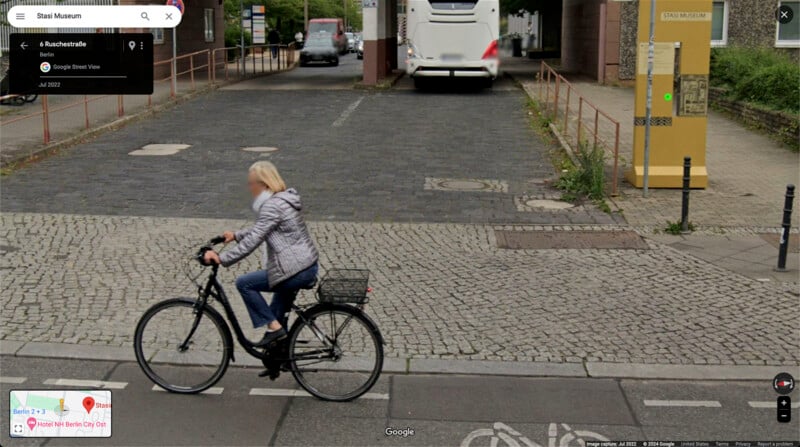
It is no shock then that Germans, even today, get a bit squirmy at the idea of nebulous entities surveilling them and collecting data.
The modern German state has built itself into a world power on the graves of two destructive and horrific governments that had little respect for privacy.
Google Street View’s Failed German Invasion in 2009-2011
When Google launched Street View in the United States in 2007, there was some trepidation here and there, but the company managed to map five million miles of roads across nearly 40 countries in its first five years. By its 10th birthday, Street View had captured 10 million miles of roads in 83 countries.
All the while, Germany remained conspicuously absent, save for a few bits of Street View data here and there. As Google mapped the surrounding nations, covering them in a blanket of interconnected imagery, much of Germany stayed a giant Street View blank space.
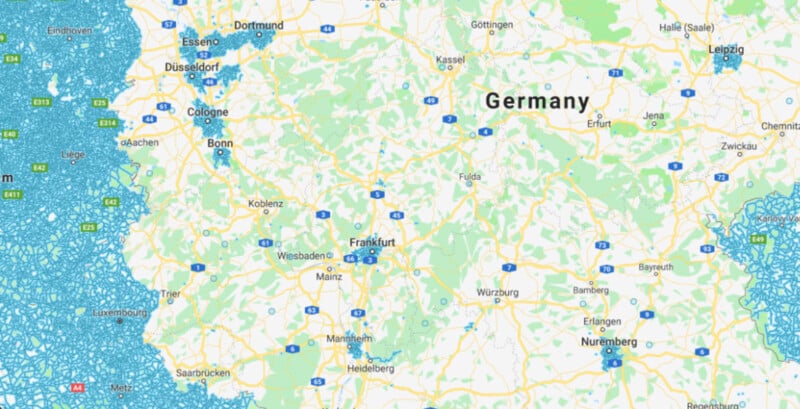
While attempting to map the country in 2010, Google learned firsthand just how serious Germans are about privacy. The company said it would begin mapping streets in 20 of the largest German cities, and the backlash was fierce and immediate.
The then German Consumer Protection Minister, Ilse Aigner, had said that Berlin and Google reached an understanding earlier that year, and that Google would only start its Street View service when all privacy concerns had been addressed.
“What is private must remain private,” Aigner said.
For its part, Google said there would be no delay, despite people finding out that Google had been using unencrypted Wi-Fi data to help it generate panoramic images — a pretty serious issue that led Austria to outright ban Google Street View until 2017. Even still, Austrian privacy laws have kept the country quite sparsely-mapped on Street View.
“We take privacy very seriously,” said a Google Germany spokesperson, Lena Wagner, in a 2010 interview with Deutsche Welle.
“Many fears are based on misinformation such as Street View imagery is real-time — in fact it is anywhere between a few months to up to two years old at the time a given area is introduced. We take privacy protections very seriously and that’s why we have developed state of the art operational and technological controls for Street View, [for example] including the automatic blurring of faces and license plates,” Wagner said of people’s fears at the time of Google Street View, adding that Google Street View’s imagery is “no different” than what regular people can capture themselves walking down the street.
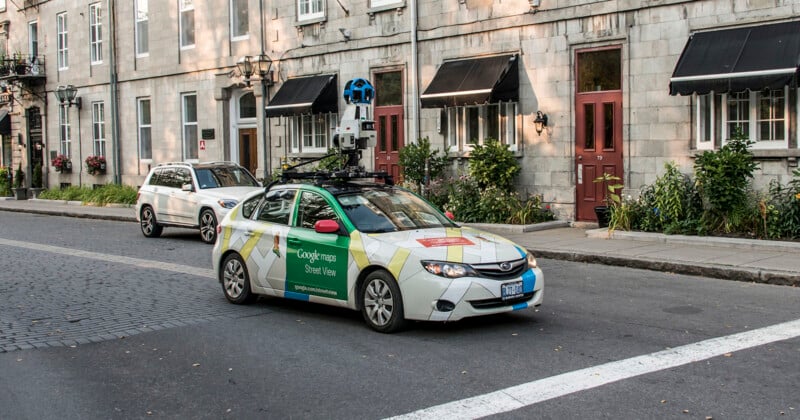
Germany was the first, and only, country in which Google ever allowed people to opt-out permanently from having their homes imaged by Street View cameras before any imagery was published. Google believed this was sufficient, and would smooth over concerns.
Well, that’s not quite how Germans saw it at the time. German citizens vandalized Street View cars and cameras and threatened people.
Aigner called Google Street View a “million-fold violation of the private sphere,” saying that no secret service in the world would collect private data “so unabashedly.” The German government demanded that Google get consent from everyone photographed by Street View cameras.
The practical concerns were immediate, and Google ultimately halted its planned Street View expansion in Germany in 2011 despite achieving a key legal victory in a Berlin court in 2010.
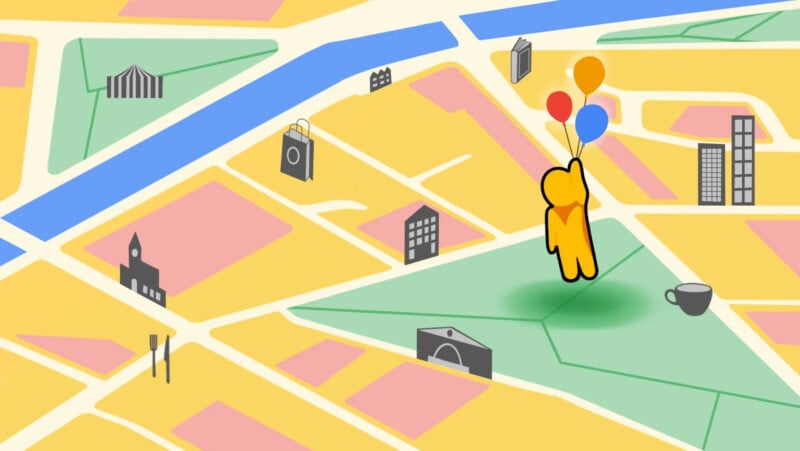
Where Does Street View Stand in Germany Today?
Lo and behold, Google tried again with Street View in Germany last year, and the rollout, although limited in scope compared to neighboring nations, has gone relatively smoother this time around.
“As always, we take your privacy seriously and automatically make faces and license plates unrecognizable,” Google wrote on its German blog last July.
In a somewhat transparent attempt to avoid the same issues as in 2010 and 2011, Google is working alongside a German privacy commission this time.
The road to catching up with surrounding countries is a long and difficult one. But for now, Google is capturing photos at street level in Germany, and people appear significantly less upset than before.
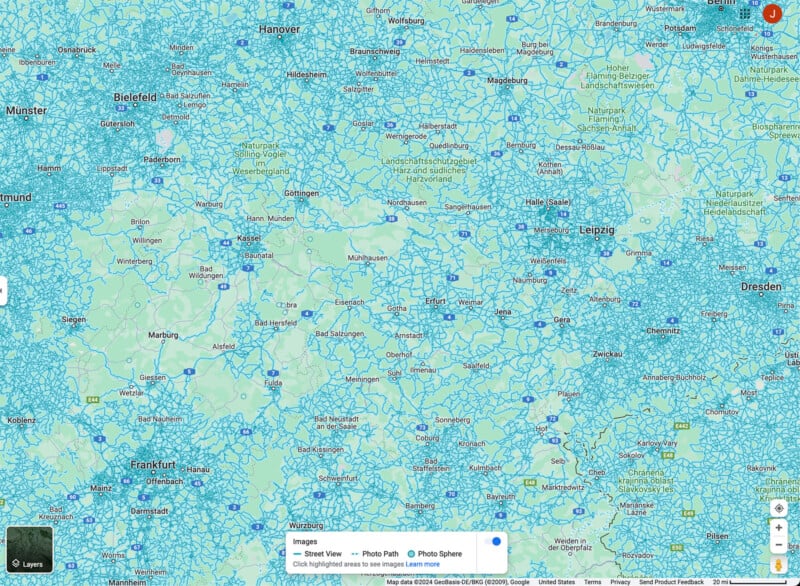
Why is Google Street View Working in Germany Now When it Failed Miserably Before?
Has people’s view of Street View changed since then or has the German desire for privacy evolved? My money is on the latter, although there’s no doubt that some people find Street View so useful that it’s worth the potential invasion of privacy.
Even in 2009 and 2010, some German communities were rallying for Street View to pick their city, in the hopes that it would jumpstart tourism and the local economies, which had undoubtedly taken a hit in the 2008 economic crash.
As time passes, people who lived through German surveillance states die, replaced by a younger generation with no first-hand experience and the fears that come with it. Besides, tech companies like Google and Meta have encroached on privacy one small step at a time.
Like the famous allegory about a frog being slowly boiled alive, privacy violations don’t seem so upsetting when delivered bit by bit over time. One of the world’s most private societies was a longtime holdout to the behemoth that is Google, but it, too, has been boiled.